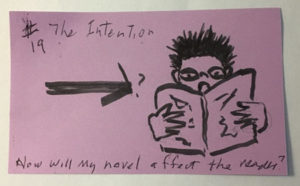
Novel Basics Card # 18
The Reader Card
The Reader Card asks the question,
“Who will read my novel?”
By now, you probably have a fairly good idea of who will want to read your novel. For one thing, chances are good that your target or ideal reader reads the same sorts of novels as you do, and lots of them, too.
Try to get specific in identifying your ideal reader. For instance, if she reads women’s fiction, does she prefer cozy mysteries with women sleuths? Are the sleuths amateurs or police officers? Or does your ideal reader love romance novels? Must those books be wholesome and clean, with maybe a shy kiss at the end? Or does your reader relish erotica with lots of heavy breathing?
Is your ideal reader a male who enjoys a blood and guts, action-packed thriller with some very specific sex scenes?
As like as not, your ideal reader is the same gender as your protagonist and a similar age as well because it’s customary in publishing that the reader is about the same age as the protagonist of a novel. (In Young Adult fiction, the protagonist might be a bit older than the reader in order to serve as a role model.)
Long ago I had the fantasy that someday I’d write the book that everybody reads the year it comes out. I haven’t written that novel yet. But Suzanne Collins might have come close with The Hunger Games. A friend’s twelve-year-old granddaughter read those books and so have I, many decades older. Some of my contemporaries have read every one of J.K. Rowling’s Harry Potter books.
Speaking of that writer, Rowling has written and published four novels in the Cormoran Strike series so different from the Harry Potter series that she uses the pseudonym of Robert Galbraith. The target readers for those two series are very different and their expectations quite different as well.
Next we’ll talk a bit more about the reader as we discuss Card # 19.

Novel Basics Card # 19
The Intention Card
(Card # 19 is probably my favorite card from my entire pack.)
The Intention Card asks the question,
“How will my novel affect the reader?”
The novel is a tool of infinite possibilities, a sort of Swiss Army knife with a million blades. That’s one of the reasons I read. When I pluck a novel off the new mysteries shelf at the library and bring it home, I’m filled with hope that this novel will surprise me. Maybe the author will say something new or at least in a different way: tease me, thrill me, move me to laughter and to tears in the same book, make me think about the human experience in some new way, expand my life, or simply help me escape my troubling or mundane world for a few hours.
Note: our local libraries are all shut down right now. Yours probably is, too. But many still offer new books through Overdrive that you can check out and read on your tablet.
At this point, I’ll circle back to my brief history of plot by mentioning that Aristotle said the purpose of a tragedy is catharsis, to purge the audience with pity and fear by seeing a man fall from grace through his own hubris.
As for me, I believe that laughter is the best medicine for whatever ails you in life, so I like to make people laugh or at least smile when they read my novels and stories. And I give my stories happy endings.
So what’s the primary intention of your novel? Do you want to entertain your reader by scaring the heck out of him with your horror fiction? Do you want to make her feel sexy with your erotic romance? Or do you want to create a puzzle in a cozy mystery for your reader to figure out? Maybe you want to move your reader to empathize with other people who have survived great adversity, to understand some truth or theme about the human condition from someone else’s suffering that your reader can experience vicariously.
In addition, one of the best things about the novel is its ability to say something worthwhile. So give at least a tentative answer to the question the Intention Card asks.
We have one last card. And then your personalized Novel Basics pack will be complete. Join me next time to discover the identity of Card # 20.